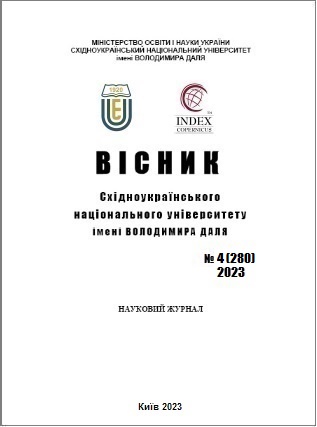The social security system of the city in the conditions of digital transformation
DOI:
https://doi.org/10.33216/1998-7927-2023-280-4-41-46Keywords:
level of social security of the city, national economy, development, risks and threats, digital platforms, digital business, transformation, digital economy, digital technologies, smart entrepreneurship, economic security system, social subsystem, digital transformationAbstract
The presented article examines the main features of the modern social security system of the city, presents the main characteristics of social security and proposed ways of developing the city's social security under the conditions of digital transformation. Digital transformation of social security systems in cities makes it possible to create more flexible and effective mechanisms for supporting citizens. The use of innovative technologies contributes to improving the quality of services and responding to changes in the social environment, ensuring greater social justice and sustainability in the development of cities. The main goal of the article is to determine the direction of the formation of the social security system of the city in the conditions of digital transformation, to determine its main components and to analyze possible ways of its improvement. Digital transformation can play a key role in improving the social security systems of cities and ensuring effective support for residents. To improve the social security system, the possibility of introducing electronic platforms for registration and submission of applications for receiving social services is being considered, which will simplify the process and reduce bureaucracy. Access to online systems for residents and social workers to monitor and update the status of applications and payments is also optimized. It is also important to take into account the use of analytics and artificial intelligence to analyze data about social groups and determine their needs; provision of personalized social support based on analysis of individual needs and circumstances; introduction of cashless transactions for the payment of social benefits and benefits, which will ensure quick and safe receipt of funds; using systems to monitor social resource balances and cost effectiveness to improve budget management. The digital transformation of social security can improve the availability and quality of social services, reduce bureaucratic barriers and contribute to more efficient use of resources to improve the quality of life of urban residents. All this contributes to the creation of a more modern and flexible approach to social support.
References
1. Панченко В., Резнікова Н., Птащенко О., Іващенко О. Інституційні механізми активізації ринку праці в умовах повоєнного відновлення економіки України. № 23 (2023): Інвестиції: практика та досвід. DOI: https://doi.org/10.32702/2306-6814.2023.23.18. https://nayka.com.ua/index.php/investplan/article/view/2585
2. Tetyana Oleksiyuk, Olena Ptashchenko, Viktor Krasnoshchok, Dymytrii Grytsyshen and Larysa Sergiienko. Development of Information Policy of Ukraine under Martial Law. [ref]: vol.21.2023. Review of Economics and Finance, 2023, 21, 1432- 1437 available at: https://refpress.org/ref-vol21-a157/, DOI: https://doi.org/10.55365/1923.x2023.21.157
3. Kateryna Alekseieva, Mykhailo Maletych, Olena Ptashchenko, Olena Baranova and Zoriana Buryk. State Business Support Programs in Wartime Conditions. Economic Affairs, Vol. 68, No. 01s, pp. 231-242, February 2023 DOI: 10.46852/0424- 2513.1s.2023.2 URL: https://economicaffairs.co.in/Journal/abstract/id/NTcyMw==
4. Баранов О. А. Трансформація: соціальна & цифрова & правова : монографія у 3-х т. Т. 1. Порятунок цивілізації: економіка результату. Одеса : Видавничий дім «Гельветика». 2022. 272 с.
5. Michal Kosinski, David Stillwell & Thore Graepel, “Private traits and attributes are predictable from digital records of human behavior” (2013) 110:15 Proceedings of the National Academy of Sciences 5802.
6. Karchevskyi, M., Losych, S., & Germanov, S. (2023). Socialization of artificial intelligence and transhumanism: legal and economic aspects. Baltic Journal of Economic Studies, 9(1), 61-70. https://doi.org/10.30525/2256-0742/2023-9-1-61-70
7. Результати цифрової трансформації в регіонах України. URL: https://thedigital.gov.ua/news/rezultati-tsifrovoitransformatsii-v-regionakhukraini-1
8. Трихліб Крістіна Олексіївна, Ковтун Володимир Володимирович. «Реалізація права на доступ до Інтернету: Україна vs міжнародна практика». Міжнародна науково-практична конференція «Актуальні питання розвитку юридичної науки та практики» URL: https://law.univ.kiev.ua/ua/pro-iurydychnyifakultet-statti/215-zaochne-viddilennia/prostooholoshennia/4834-mizhnarodna-naukovopraktychna-konferentsiiaaktualni-pytanniarozvytku-iurydychnoi-nauky-ta-praktyky
9. Права людини в умовах цифрової трансформації суспільства : кол.моногр. / [Д. В. Лученко, О. В. Капліна, В. Я. Настюк та ін.] ; за ред. Д. В. Лученка ; Нац. юрид. ун-т ім. Ярослава Мудрого. Харків, 2022. 272 с.
10. Про захист персональних даних: Закон України від 01.06.2010 № 2297-VI. URL: https://zakon.rada.gov.ua/laws/show/2297-17#Text
11. Доронін І. М. Цифровий розвиток та національна безпека у контексті правових проблем. Інформація і право. 2019. № 1. С. 29- 36.
12. Білоус І. І. Поняття соціальної безпеки та її роль в системі національної безпеки держави. Ефективна економіка. 2019. № 3. – URL: http://www.economy.nayka.com.ua/?op=1&z=6955. DOI: 10.32702/2307-2105-2019.3.41

